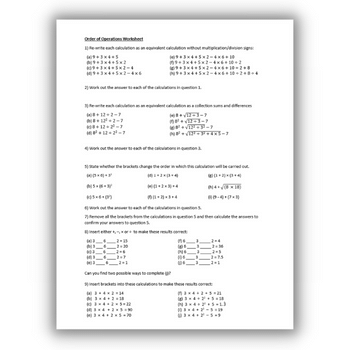This BODMAS questions or order of mathematical operations worksheet encourages pupils to recognise that we need to reduce calculations to those involving sums and difference (Q1-4).
Peter Mattock’s brilliant resource then introduces the role of brackets. Pupils are tasked to examine whether the brackets are required (Q5-7).
The correct answer for every question is included at the end of the worksheet for your convenience. This worksheet is suitable for KS3, although this topic also appears on Foundation tier at GCSE level.
Addition before multiplication
Next in Q10 is an opportunity for lots of practice of reasoning with calculations. This includes where addition can be completed before multiplication (using the distributive property).
BODMAS questions maths revision
Included in this BODMAS questions worksheet are the following tasks:
- Rewrite each calculation as an equivalent calculation without multiplication/division signs. Work out the answer to each of the calculations
- Rewrite each calculation as an equivalent calculation as a collection of sums and differences. Work out the answer to each of the calculations
- State whether the brackets change the order in which this calculation will be carried out. Work out the answer to each of the calculations
- Remove all the brackets from the calculations. Calculate the answers to confirm your previous answers
- Insert either +, –, × or ÷ to make these results correct
- Insert brackets into these calculations to make these results correct
- Rewrite these calculations as a single multiplication
Is your calculation correct? Find all the answers to questions at the end of the worksheet.
Free numeracy worksheet for GCSE maths
We’ve designed these practice questions so that pupils can try all significant aspects of the content. They’ll also notice the structures behind each content area.
To succeed, pupils will need to engage in reasoning to explain why they’re seeing the results they are.
Worksheets requiring arithmetic are generally limited to integer calculation. This means they can be used with pupils not yet be fluent in decimal/fractional arithmetic.
If your students have these pre-requisite skills, you can adapt the questions (where appropriate) to include this content.
Peter Mattock is an assistant headteacher and secondary mastery lead for the East Midlands South Maths Hub. He’s the author of Visible Maths and Conceptual Maths (Crown House Publishing). Follow Peter on Twitter at @MrMattock.
Read about why Owen Elton thinks it’s time for maths teachers to bin BODMAS. Download more Key Stage 3 maths worksheets.














